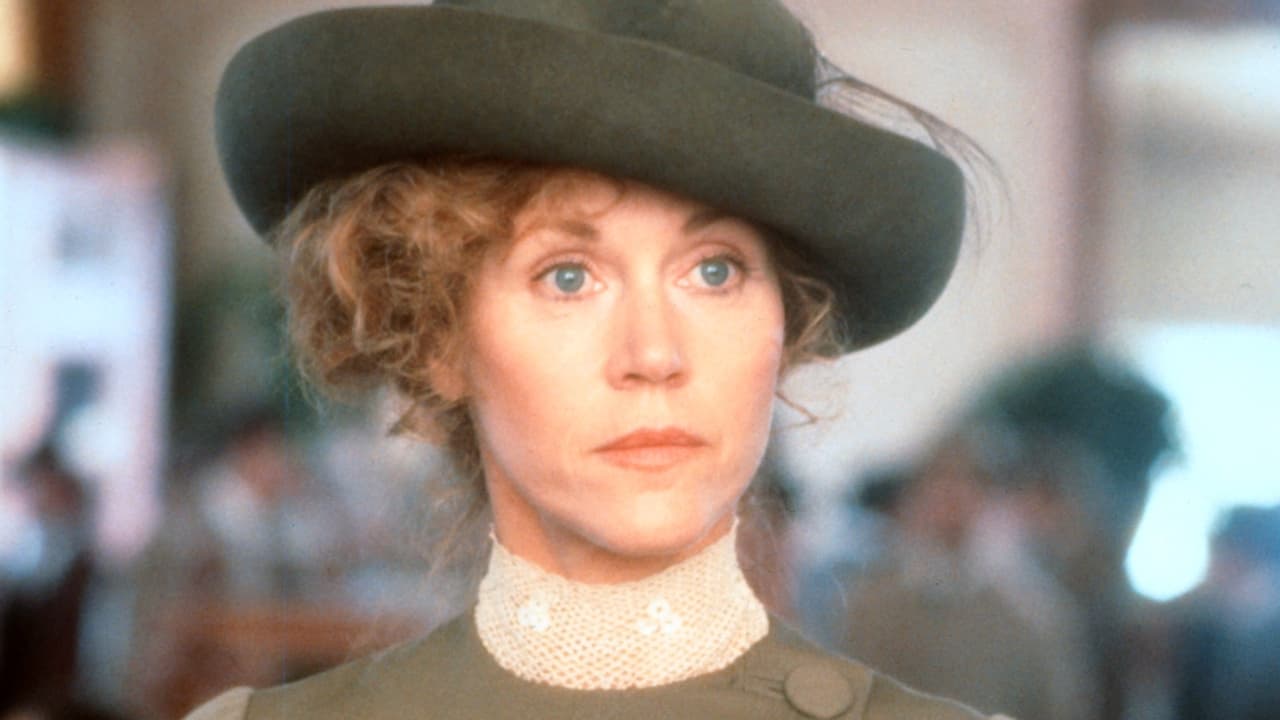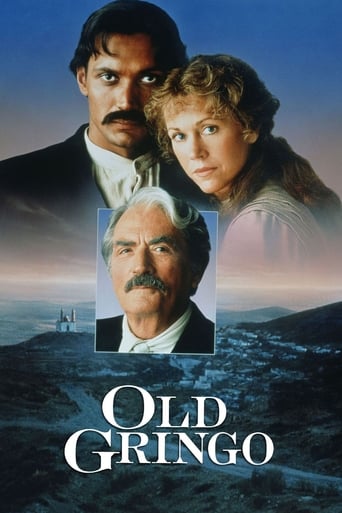PlatinumRead
Just so...so bad
Pluskylang
Great Film overall
TaryBiggBall
It was OK. I don't see why everyone loves it so much. It wasn't very smart or deep or well-directed.
Senteur
As somebody who had not heard any of this before, it became a curious phenomenon to sit and watch a film and slowly have the realities begin to click into place.
mark.waltz
We don't understand the philosophy of "too much", whether it be too much love, too much passion, too much anger, too much hate. That's what old gringo Gregory Peck (as an aging writer) and middle aged gringa Jane Fonda learn in this study of life going on during a revolution in Mexico during the early part of the 20th century. Thanks to revolution leader Jimmy Smits, they learn quite a bit, although I wonder if Fonda needed to learn to stop gaping at Peck in awe and remind herself to get back in character.Fonda is a bored wealthy American who runs out on society and ends up in Mexico where she is a first hand witness to the violence at hand. Even the hotel staff are involved, replacing her belongings with weapons and using her room as a base of operations. Smits, initially ridiculing both Fonda and Peck, slowly begins to understand and trust them, and through him, they begin to learn what the Mexicans are fighting for, and through them, he learns that there's more than just national pride in living your life. Beautifully filmed, this was touted as a triumph for Peck even before it came out, with Oscar buzz for possibly his last film. (It wasn't.) But pre- release buzz is often disappointing, and while Peck was praised, the film wasn't. Fonda isn't as much bad in this as she is unmemorable, certainly no "Julia" or "Coming Home" in her impressive career. Smits gives a very layered performance that goes beyond the lothario and the fighter. This should have been his pass to a successful film career as it was a wind down in Peck's. The other Hispanic actors in Smit's circle also are very diverse, from the young paper boy trained from birth to fight to the prostitute who gives Peck a freebee to the other young women who laugh at gringa Fonda's foreign ways but secretly envy her. This isn't the disaster it's been made out to be, just a missed opportunity with the lack of passion that the on screen characters live whether fighting, partying or loving.
dfeigin
There is more soul in this film than in 50 'modern' films.While there is a lot of bad acting, and many other flaws in this movie, there are some GREAT scenes, great dialog, great characters, and great performances. Gregory Peck has some very memorable, outstanding monologues, there are many interesting and complex relationships, and there are no simple resolutions to conflicts.Again- there are many areas of the film that do not work: doesn't matter, ignore them. There is tremendous depth here, and a lot of value to draw from the good parts of this movie. Peck and Smits are great, and even Fonda has some excellent moments.They don't make 'em like this any more, and they don't make actors like Peck.
weezeralfalfa
At one level, this film focuses on a much delayed coming of age adventure for Jane Fonda's character, Harriet Winslow, who suddenly decides she has had enough of her mother-dominated spinster school marm life. Yes, we would expect her to be maybe 10-20 years younger than her 50 years, and some have suggested she was thus miscast. However, her relatively advanced age makes her crush on Peck's 70 year old character, Ambrose Bierce, more believable. Peck's characterization of Bierce is somewhat at odds with what I have read of this man. We get the impression that, like Harriet, he has decided to forsake his bookish life, as a sick old man, for a final hands-on adventure, as an aid to the rebels in the Mexican revolution. However, the real Bierce fought in the Civil War and later crossed the continent on another assignment. He was not a one-dimensional bookish writer, by experience.Fonda simultaneously develops a crush on both Bierce and General Arroyo(Jimmy Smits). They are both seen as romantic rebels, though of very different sorts and for different personal reasons. Harriet reminds Bierce of his daughter, whom he hasn't seen for many years, while Bierce reminds Harriet of her father, who abandoned his domineering wife for a new love, and who fought in the Spanish American war to help free Cuba. But after partially destroying the Miranda mansion where he was conceived, Arroyo delays taking his troops to join Villa's, as ordered. Arroyo's bedding of Harriet on the very bed where he was conceived symbolically reverses the power relationship in which his European father raped his native American mother. He finds the original Spanish land grant papers giving the land of this hacienda to the peasants. Since Spain no longer governed Mexico, these papers were not necessarily valid, as Pierce points out, but Arroyo refuses to heed. Arroyo's shooting of his favorite horse and of Bierce reinforces his determination to stay at the hacienda of his birth instead of joining Villa.There are several references accusing Arroyo of having become the new Miranda, and thus betraying the revolution. I don't understand why Arroyo had one of his soldiers shot for doing what he himself was doing. He must have known he would receive the same sentence if he did not soon join Villa's forces. Perhaps this symbolized the near universal tendency of revolutionary leaders to gradually become tyrants as bad or worse than those they topple. So it had been with Porfirio Diaz, the once revolutionary general the revolutionists now fought against. So it would be with various successors to Diaz during these turbulent times.This is an entertaining film, for the most part. There are enough action scenes to complement the philosophizing and other tamer scenes. You will have to pay close attention or see it several times to dig out all the symbolism. I can see why this film was important to Jane Fonda. It is, in a sense, autobiographical, symbolizing her mid-life transformation from an apolitical sex kitten into an anti-establishment political spokeswoman for the powerless of the world.
bkoganbing
Mexico in the teen years of the last century was no place to be, not even for Mexicans as the country broke down completely after the overthrow of dictator Porfirio Diaz. A lot of people grabbed for power, including one Pancho Villa who got emboldened enough to cross the U.S. border and shoot up Columbus, New Mexico. That got Woodrow Wilson to sending the army to capture Villa without success.But that's getting way ahead of this story. It concerns American writer Ambrose Bierce who went to revolutionary Mexico and disappeared into obscurity much in the manner of the French poet Francois Villon. The plot of this film offers a theory as to what could have happened to Bierce.Dominating the film is Gregory Peck in the title role. He captures Bierce in all of his sardonic cynicism for which his writing lives on. This Bierce has all the reason to just want to leave his world behind, his wife had recently died, but not after being discovered to be involved with another man. Two of his three children, both of his sons died violent deaths. Bierce was a man who felt he had no reason to live on.Peck gets involved with two other people in a romantic triangle, Jane Fonda as a spinster who gets hired to tutor some landowner children and Jimmy Smits who's using the revolution to settle some personal scores with that same landowner family. In fact Smits gets himself rather caught up in the whole ambiance of being to the manor born with what he feels are good reasons.All though all three of the leads have been in much better product, Old Gringo still is a good piece of cinema and does capture some of the anarchy that was revolutionary Mexico.

